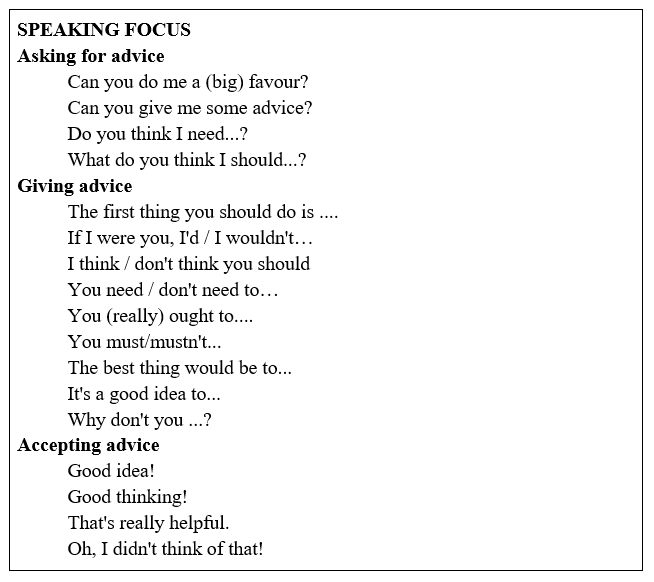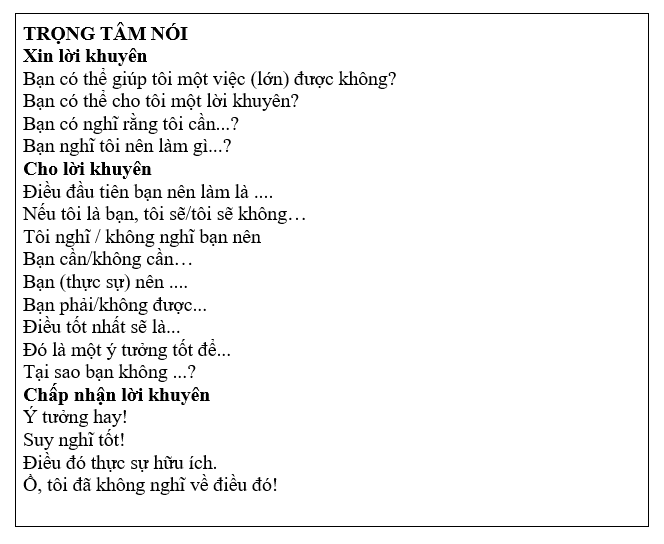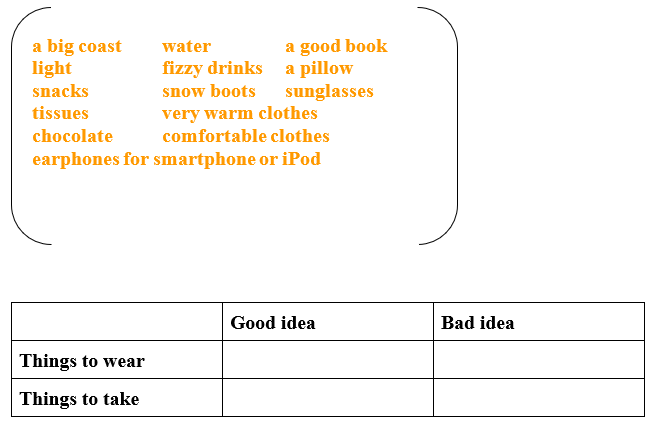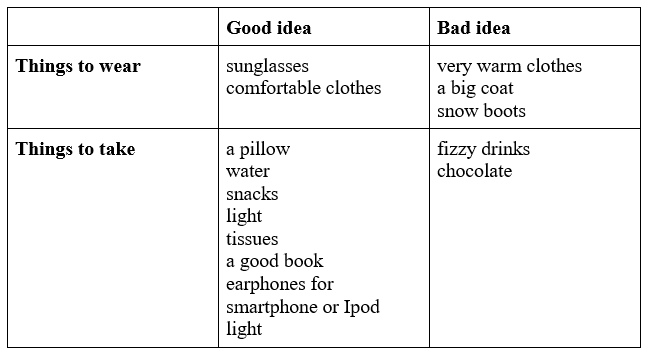Tiếng Anh 11 Unit 6 6.8 Speaking1. Imagine you are going to England to do an English course and you are going to stay with an English family for a month. Write a list of things you need to take with you. Compare your list with a partner. 2(6.11) Listen to Markus asking Sophie for advice about what to take to England and answer the questions. 3(6.12) Listen again and tick ✓ the expressions in the SPEAKING FOCUS that you hear. Which three expressions on the list are not used in the dialogue? GÓP Ý HAY - NHẬN NGAY QUÀ CHẤT Gửi góp ý cho HocTot.Nam.Name.Vn và nhận về những phần quà hấp dẫn
Lựa chọn câu để xem lời giải nhanh hơn
Bài 1 Asking for and giving advice (Yêu cầu và đưa ra lời khuyên) I can ask for, give and accept advice. (Tôi có thể yêu cầu, đưa ra và chấp nhận lời khuyên) 1. Imagine you are going to England to do an English course and you are going to stay with an English family for a month. Write a list of things you need to take with you. Compare your list with a partner. (Hãy tưởng tượng bạn sẽ đến Anh để tham gia một khóa học tiếng Anh và bạn sẽ ở với một gia đình người Anh trong một tháng. Viết một danh sách những thứ bạn cần mang theo bên mình. So sánh danh sách của bạn với một bạn cặp.) Lời giải chi tiết: List of things I need to take: passport phone phone charger clothes money books (Danh sách những thứ tôi cần mang theo: điện thoại hộ chiếu quần áo sạc điện thoại sách tiền) Bài 2 2(6.11) Listen to Markus asking Sophie for advice about what to take to England and answer the questions. (Hãy lắng nghe Markus xin lời khuyên của Sophie về những gì cần mang đến Anh và trả lời các câu hỏi.) 1. Which of the things on your list do they mention? (Họ đề cập đến những thứ nào trong danh sách của bạn?) 2. Why does Sophie want Markus to remember his phone charger? (Tại sao Sophie muốn Marcus ghi nhớ cục sạc điện thoại của mình?) Bài 3 3(6.12) Listen again and tick (✓) the expressions in the SPEAKING FOCUS that you hear. Which three expressions on the list are not used in the dialogue? (Nghe lại và đánh dấu (✓) vào các cách diễn đạt trong phần NÓI TRỌNG TÂM mà bạn nghe được. Ba biểu thức nào trong danh sách không được sử dụng trong đoạn hội thoại?) Phương pháp giải:
Bài 4 4. Imagine a friend from England wants to visit your country during the winter. Complete the advice with one or two words from the SPEAKING FOCUS. (Hãy tưởng tượng một người bạn từ Anh muốn đến thăm đất nước của bạn trong mùa đông. Hoàn thành lời khuyên với một hoặc hai từ trong TRỌNG TÂM NÓI.) 1. The _______ you should do is book your flights. 2. If I _______, I'd pack lots of warm clothes. 3. You _______ to bring a lot of formal clothes. 4. I _______ you should bring lots of cash. 5. You _______ remember to get some 6. You _______ to make sure you have a warm winter coat. Lời giải chi tiết: 1. The first thing you should do is book your flights. (Điều đầu tiên bạn nên làm là đặt chuyến bay của bạn.) 2. If I were you, I'd pack lots of warm clothes. (Nếu tôi là bạn, tôi sẽ mang thật nhiều quần áo ấm.) 3. You need to bring a lot of formal clothes. (Bạn cần mang theo nhiều quần áo trang trọng.) 4. I think you should bring lots of cash. (Tôi nghĩ bạn nên mang theo nhiều tiền mặt.) 5. You ought to remember to get some travel insurance. (Bạn nên nhớ mang một số bảo hiểm du lịch.) 6. You need to make sure you have a warm winter coat. (Bạn cần chắc chắn rằng mình có một chiếc áo khoác mùa đông ấm áp.) Bài 5 5. Discuss which ideas below are good and which are bad for a very long bus journey. Give reasons. Then complete the table. (Thảo luận ý kiến nào dưới đây là tốt và ý kiến nào là không tốt cho một hành trình xe buýt dài. Đưa ra lý do. Sau đó hoàn thành bảng.)
Lời giải chi tiết:
Good idea: I think we should bring snacks, water because we will get hungry or thirsty. (Tôi nghĩ chúng ta nên mang theo đồ ăn nhẹ, nước vì chúng ta sẽ đói hoặc khát.) We can bring tissues to keep our hands clean after having some snacks or in case we have a runny nose. (Chúng ta có thể mang theo khăn giấy để giữ sạch tay sau khi ăn nhẹ hoặc phòng khi bị sổ mũi.) We should bring a good book or earphones for smartphone or iPod to keep ourselves entertained. (Chúng ta nên mang theo một cuốn sách hay hoặc tai nghe cho điện thoại thông minh hoặc iPod để giải trí.) We should wear sunglasses and comfortable clothes to feel comfortable and help us fall asleep easier. (Chúng ta nên đeo kính râm và mặc quần áo thoải mái để cảm thấy thoải mái và dễ đi vào giấc ngủ hơn.) Bad idea: I don’t think we should wear a big coat, snow boots or very warm clothes on the bus because it’s very hard for us to move around in. (Tôi không nghĩ chúng ta nên mặc áo khoác rộng, ủng đi tuyết hoặc mặc quần áo rất ấm trên xe buýt vì chúng ta rất khó di chuyển trong đó.) We shouldn’t bring fizzy drinks or sweets like chocolate because they will make us easily nauseous. (Không nên mang theo đồ uống có ga hay đồ ngọt như sôcôla vì sẽ dễ gây buồn nôn.) Bài 6 6. Follow the instructions below to prepare a dialogue. Use the SPEAKING FOCUS to help you. Then act it out to the class. (Thực hiện theo các hướng dẫn dưới đây để chuẩn bị một cuộc đối thoại. Hãy sử dụng TRỌNG TÂM NÓI để giúp bạn. Sau đó diễn nó trước lớp.) Student A: You're from England. You're going to travel to Student B's country by bus. You've never been on a long bus journey before. Ask Student B for advice about what to wear, what to take for the journey and what kind of presents to take for the family. (Sinh viên A: Bạn đến từ Anh. Bạn sẽ đến đất nước của Sinh viên B bằng xe buýt. Bạn chưa bao giờ đi trên một hành trình dài bằng xe buýt trước đây. Nhờ học sinh B tư vấn về việc mặc gì, mang theo gì cho chuyến đi và loại quà nào nên mang về cho gia đình.) Student B: Student A is visiting you from England. He/She is going to travel to your country by bus. Give him / her some advice about what to wear, what to take for the journey and what kind of presents to bring for your family. (Sinh viên B: Sinh viên A đến thăm bạn từ Anh. Anh ấy / Cô ấy sẽ đi du lịch đến đất nước của bạn bằng xe buýt. Hãy cho anh ấy/cô ấy một số lời khuyên về việc nên mặc gì, mang gì cho chuyến đi và nên mang quà gì cho gia đình.) A: Hi Thu. Can you do me a big favour? I need your help. B: Yes, sure. What's the problem? A: Well, you know I'm travelling to your country by bus. I've never been on a long bus journey before and I'm not sure what to take. Can you... (A: Chào Thu. Bạn có thể giúp tôi một việc lớn được không? Tôi cần bạn giúp. B: Vâng, chắc chắn rồi. Vấn đề là gì? A: Chà, bạn biết đấy, tôi sẽ đến đất nước của bạn bằng xe buýt. Tôi chưa bao giờ đi một chuyến xe buýt dài trước đây và tôi không biết phải chọn gì. Bạn có thể…) Lời giải chi tiết: A: Hi Thu. Can you do me a big favor? I need your help. B: Yes, sure. What's the problem? A: Well, you know I'm travelling to your country by bus. I've never been on a long bus journey before and I'm not sure what to take. Can you give me some advice? B: Why not? The first thing you should do is wear comfortable clothes that will keep you warm but also easy to move around in. You also ought to bring some snacks and bottles of water so that you can not get hungry and thirsty. Don’t forget a good book or headphones to keep yourself entertained during the long journey. A: What do you think I should bring much money? B: Good thinking. If I were you, I’d bring lots of cash. So you can buy what you want easier. Moreover, I don’t think you should bring a credit card. In some areas, your credit card is inactive. A: Oh. I didn’t think of that. And I also want to buy something as presents for my family. What should I buy? B: Let’s buy souvenirs to remember your trip. “Nón lá” may be a good choice because it is the traditional symbol of Việt Nam. A: That’s really helpful. Thank you so much. (A: Chào Thu. Bạn có thể giúp tớ một việc lớn được không? Tôi cần bạn giúp. B: Vâng, chắc chắn rồi. Vấn đề là gì? A: Chà, bạn biết đấy, tớ sẽ đến đất nước của bạn bằng xe buýt. Tớ chưa bao giờ đi một chuyến xe buýt dài trước đây và tớ không biết phải chọn gì. Bạn có thể cho tớ một lời khuyên không? B: Tại sao không? Điều đầu tiên bạn nên làm là mặc quần áo thoải mái để giữ ấm nhưng cũng dễ di chuyển. Bạn cũng nên mang theo một số đồ ăn nhẹ và chai nước để bạn không bị đói và khát. Đừng quên một cuốn sách hay hoặc tai nghe để giúp bạn giải trí trong suốt hành trình dài. A: Bạn nghĩ tớ nên mang theo nhiều tiền không? B: Tư duy tốt đấy. Nếu tớ là bạn, tớ sẽ mang theo rất nhiều tiền mặt. Vì vậy, bạn có thể mua những gì bạn muốn dễ dàng hơn. Hơn nữa, tớ không nghĩ bạn nên mang theo thẻ tín dụng. Ở một số khu vực, thẻ tín dụng của bạn không hoạt động. A: Ồ. Tớ đã không nghĩ đến điều đó. Và tớ cũng muốn mua một cái gì đó làm quà cho gia đình tớ. Tôi nên mua cái gì? B: Hãy mua quà lưu niệm để kỷ niệm chuyến đi của bạn. “Nón lá” có thể là một lựa chọn tốt vì nó là biểu tượng truyền thống của Việt Nam. A: Nó thực sự giúp ích lắm. Cảm ơn bạn rất nhiều.)
|

















